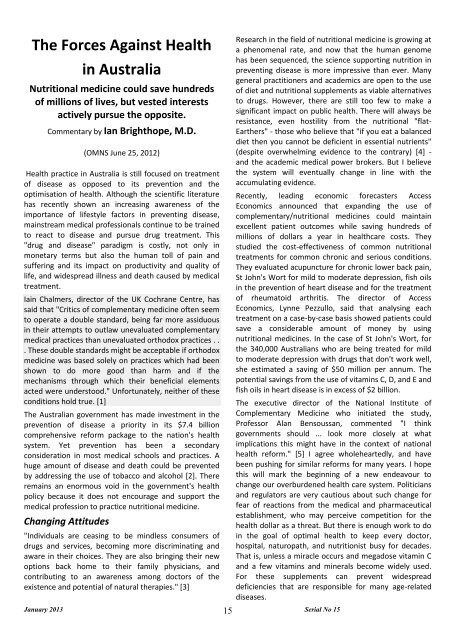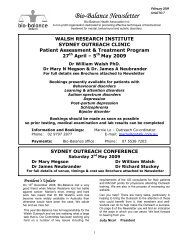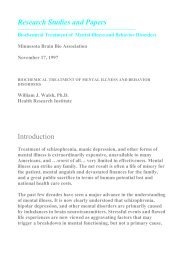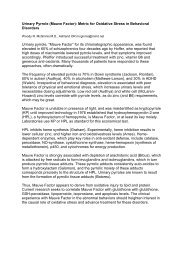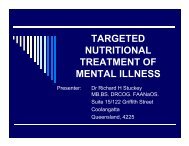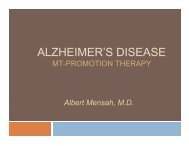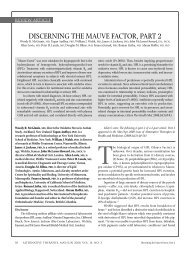Download PDF - Bio-Balance Health
Download PDF - Bio-Balance Health
Download PDF - Bio-Balance Health
- No tags were found...
You also want an ePaper? Increase the reach of your titles
YUMPU automatically turns print PDFs into web optimized ePapers that Google loves.
The Forces Against <strong>Health</strong>in AustraliaNutritional medicine could save hundredsof millions of lives, but vested interestsactively pursue the opposite.Commentary by Ian Brighthope, M.D.(OMNS June 25, 2012)<strong>Health</strong> practice in Australia is still focused on treatmentof disease as opposed to its prevention and theoptimisation of health. Although the scientific literaturehas recently shown an increasing awareness of theimportance of lifestyle factors in preventing disease,mainstream medical professionals continue to be trainedto react to disease and pursue drug treatment. This"drug and disease" paradigm is costly, not only inmonetary terms but also the human toll of pain andsuffering and its impact on productivity and quality oflife, and widespread illness and death caused by medicaltreatment.Iain Chalmers, director of the UK Cochrane Centre, hassaid that "Critics of complementary medicine often seemto operate a double standard, being far more assiduousin their attempts to outlaw unevaluated complementarymedical practices than unevaluated orthodox practices . .. These double standards might be acceptable if orthodoxmedicine was based solely on practices which had beenshown to do more good than harm and if themechanisms through which their beneficial elementsacted were understood." Unfortunately, neither of theseconditions hold true. [1]The Australian government has made investment in theprevention of disease a priority in its $7.4 billioncomprehensive reform package to the nation's healthsystem. Yet prevention has been a secondaryconsideration in most medical schools and practices. Ahuge amount of disease and death could be preventedby addressing the use of tobacco and alcohol [2]. Thereremains an enormous void in the government's healthpolicy because it does not encourage and support themedical profession to practice nutritional medicine.Changing Attitudes"Individuals are ceasing to be mindless consumers ofdrugs and services, becoming more discriminating andaware in their choices. They are also bringing their newoptions back home to their family physicians, andcontributing to an awareness among doctors of theexistence and potential of natural therapies." [3]Research in the field of nutritional medicine is growing ata phenomenal rate, and now that the human genomehas been sequenced, the science supporting nutrition inpreventing disease is more impressive than ever. Manygeneral practitioners and academics are open to the useof diet and nutritional supplements as viable alternativesto drugs. However, there are still too few to make asignificant impact on public health. There will always beresistance, even hostility from the nutritional "flat-Earthers" - those who believe that "if you eat a balanceddiet then you cannot be deficient in essential nutrients"(despite overwhelming evidence to the contrary) [4] -and the academic medical power brokers. But I believethe system will eventually change in line with theaccumulating evidence.Recently, leading economic forecasters AccessEconomics announced that expanding the use ofcomplementary/nutritional medicines could maintainexcellent patient outcomes while saving hundreds ofmillions of dollars a year in healthcare costs. Theystudied the cost-effectiveness of common nutritionaltreatments for common chronic and serious conditions.They evaluated acupuncture for chronic lower back pain,St John's Wort for mild to moderate depression, fish oilsin the prevention of heart disease and for the treatmentof rheumatoid arthritis. The director of AccessEconomics, Lynne Pezzullo, said that analysing eachtreatment on a case-by-case basis showed patients couldsave a considerable amount of money by usingnutritional medicines. In the case of St John's Wort, forthe 340,000 Australians who are being treated for mildto moderate depression with drugs that don't work well,she estimated a saving of $50 million per annum. Thepotential savings from the use of vitamins C, D, and E andfish oils in heart disease is in excess of $2 billion.The executive director of the National Institute ofComplementary Medicine who initiated the study,Professor Alan Bensoussan, commented "I thinkgovernments should ... look more closely at whatimplications this might have in the context of nationalhealth reform." [5] I agree wholeheartedly, and havebeen pushing for similar reforms for many years. I hopethis will mark the beginning of a new endeavour tochange our overburdened health care system. Politiciansand regulators are very cautious about such change forfear of reactions from the medical and pharmaceuticalestablishment, who may perceive competition for thehealth dollar as a threat. But there is enough work to doin the goal of optimal health to keep every doctor,hospital, naturopath, and nutritionist busy for decades.That is, unless a miracle occurs and megadose vitamin Cand a few vitamins and minerals become widely used.For these supplements can prevent widespreaddeficiencies that are responsible for many age-relateddiseases.January 2013 15Serial No 15


